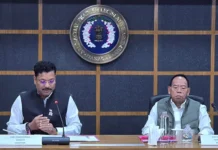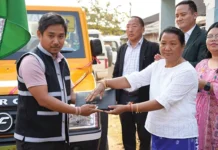NAHARLAGUN, 28 Oct: The Arunachal Electronic and Digital Media Association (AEDMA) has strongly expressed disapproval over a recent order from the department of information and public relations (DIPR), which authorizes the Arunachal Press Club and the Arunachal Pradesh Union of Working Journalists (APUWJ) to oversee policies related to media, journalists and other related activities in the state.
The AEDMA submitted a representation to the director of IPR, urging a rollback or modification of the order.
During a meeting with officials of the DIPR and members of the Arunachal Press Media Welfare Society (APMWS) at the DIPR office on Monday, AEDMA President JT Tagam stated that “AEDMA, founded in 2012 by the late Taro Chatung, has been dedicated to the welfare of electronic and digital media houses across the state. AEDMA has consistently represented the interests of the state’s media fraternity. To bypass AEDMA in matters central to digital and electronic media policies and welfare, without prior consultation, undermines its established role.”
“The order excludes many independent journalists, media houses who actively contribute to journalism in the state but are unaffiliated with any particular media organization. By giving control over media-related matters to a single NGO or group, the DIPR risks marginalizing these journalists and media houses and limiting their access to essential resources, accreditation, and support programmes crucial for their work and wellbeing,” Tagam added.
The AEDMA strongly urged the department of IPR to rescind Order No IPR (PR) 125/2011pt, dated 22 October, 2024, and restore the DIPR as the sole authority for decision-making on media-related policies, accreditation, and welfare schemes.
Earlier, APMWS President Takam Sonia also voiced dissatisfaction with the order, and requested the authorities to roll it back by 16 November, failing which, he said, their organization may resort to a democratic protest. “Such an order infringes upon the rights of independent media organizations, stifling the essence of democracy. APMWS operates under its own standard operating procedures, which differ from those of other organizations. The imposition of external norms by separate entities is inappropriate,” he said.
IPR Director Onyok Pertin assured that the memorandums would be presented to the higher authorities for an appropriate resolution, and encouraged the media organizations in the state to work collaboratively for the welfare of both the society and the state.


